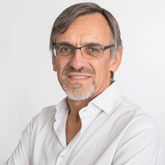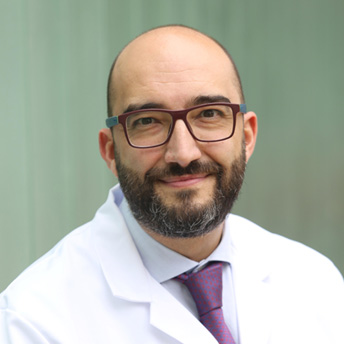
Expert Interview 4: Frequently Asked Questions (FAQs) for Second-Line (2L) and Salvage Treatments in Urothelial Cancer
Release date: 11-12-2023
Expiration date: 11-12-2024
There is a steadily widening range of second-line (2L) and subsequent treatment options for patients with advanced UC including chemotherapy, immune checkpoint inhibitors (ICIs) and novel therapies. In recent years, ICIs have predominantly replaced chemotherapy as the preferred 2L treatment. Furthermore, antibody-drug conjugates (ADC) and targeted agents have become available.
The selection of 2L and salvage treatments for advanced UC depends on many factors, including the initial treatment strategy used in the first-line setting. Molecular classifications appear to be promising in disease prognostication and prediction for UC.
Let's watch the recorded video on 'Frequently Asked Questions (FAQs) for 2L and Salvage Treatments' to gain comprehensive insights from leading experts – Dr. Francisco X. Real from National Cancer Research Center of Spain and Dr. Enrique Grande from MD Anderson Cancer Center Madrid.
This program is available with subtitles in the following languages:

参与专家

Francisco X. Real 教授
国家癌症研究中心
西班牙马德里
Francisco X. Real(Paco),MD,PhD自2004年起任西班牙巴塞罗那庞贝大学法布拉分校细胞生物学教授,2007年起也在西班牙马德里西班牙国家癌症研究中心(CNIO)工作。他于1980年在巴塞罗那大学获得MD学位,于1986年获得PhD学位。1986年至1988年在纽约纪念医院接受肿瘤内科培训,并担任内科医师。他在纪念斯隆-凯特琳癌症中心(MSKCC)的Lloyd J. Old实验室开展了博士和博士后工作。他关注于开发治疗黑色素瘤和上皮癌的免疫学策略。1988年,他加入了巴塞罗那市立医学研究所,在那里他专注于上皮癌的细胞和分子生物学。他还参与了庞培法布拉大学生物医学科学研究所的建立。
在CNIO,Real教授的研究组在胰腺癌和胰腺炎的分子机制以及膀胱癌和胰腺癌的分子病理学和流行病学领域做出了重大贡献。他的工作结合了患者样本、培养细胞和转基因小鼠的使用,并使用所有研究材料去探索出相近的相关性。该研究组工作的一个重要目的是使实验室产生的基础知识去提高对疾病的认识,并制定预防、早期诊断和治疗胰腺癌和膀胱癌的改进策略。
Real教授已发表原创性论文300余篇,其论文发表在Nature、Nature Genetics、Nature Cell Biology、Nature Communications、Nature Reviews Cancer、Gut、Gastroenterology、PNAS、JNCI、J Clin Invest、N Engl J Med、Lancet等杂志。他的论文被引用超过29000次(谷歌学术搜索),他的H指数为96。他是多个机构科学咨询委员会的成员,包括英国癌症研究研发委员会(伦敦)、Cordeliers研究中心(巴黎)、CARPEM(巴黎)、英国胰腺癌研究中心(伦敦)和国家科学研究基金会(布鲁塞尔)。他是Gut和Bladder Cancer的副主编。2015年,曾任欧洲胰腺俱乐部主席。

Enrique Grande 教授 | 主席
MD Anderson肿瘤中心马德里分院
西班牙马德里
Enrique Grande,MD,MSc,PhD 是MD Anderson肿瘤中心马德里分院肿瘤学项目的现任医学总监,Grande医生关注泌尿生殖肿瘤领域的研究,积极参与并投身于转化研究和药物早期研发部门的发展与合作。Grande医生获得PhD学位的研究方向为酪氨酸激酶抑制剂肝代谢的药代动力学和药效动力学,他曾在西班牙国家癌症研究中心(CNIO)获得分子生物学的硕士学位。他曾在同行评议的学术期刊上发表了超过200篇论文,同时也是西班牙孤儿药和罕见肿瘤研究组(GETHI)的创始人。Grande医生是很多国际期刊的编辑,也是肿瘤领域众多书籍著作的编辑。他曾参加过泌尿生殖肿瘤及神经内分泌肿瘤领域很多最新的临床研究,也帮助众多新药获得上市批准,为临床提供了更多治疗选择。
This activity is design designed for medical oncologists and urologists involved or interested in the management of urothelial cancer.
The aim of this educational activity is for participants to:
- Identify how to sequence available treatments for second-line or later-line of unresectable locally advanced or metastatic urothelial cancer
- Improve understanding of the novel drugs in development and consider the impact to optimize the new treatment strategies in the future
- Develop a greater awareness of the different molecular and pathologic subtypes of urothelial cancers and the role of prognostic and predictive biomarkers in patient management
This educational activity is provided by ACE Oncology.
This educational activity is supported by an independent grant from the Healthcare business of Merck KGaA, Darmstadt, Germany.
This activity provides content that is evidence-based, balanced, and free of commercial bias, with a primary objective to improve competence and performance of learners in order to improve patient care.
The faculty reported the following financial relationships or relationships to products or devices they or their spouses/life partners have with commercial interest related to the content of this activity:
Enrique Grande has received honoraria for speaker engagements, advisory roles or funding for continuing medical education from Advanced Accelerator Applications, AMGEN, Angelini, Astellas, Astra Zeneca, Bayer, Blueprint, Bristol Myers Squibb, Caris Life Sciences, Celgene, Clovis-Oncology, Dr. Reddy’s, Eisai, Esteve, Eusa Pharma, Genetracer, GSK, Guardant Health, HRAPharma, IPSEN, ITM-Radiopharma, Janssen, Lexicon, Lilly, Merck KGaA, MSD, Nanostring Technologies, Natera, Novartis, ONCODNA (Biosequence), Palex, Pharmamar, Pierre Fabre, Pfizer, Raffo, Roche, Sanofi-Genzyme, Servier, Taiho, Tecnofarma, Thermo Fisher Scientific and Zodiac. He has also received grants for clinical research from Astellas, Astra Zeneca, IPSEN, Lexicon, Merck KGaA, MTEM/Threshold/Tersera, Nanostring Technologies, Pfizer and Roche. He has agreed to disclose any unlabeled/unapproved uses of drugs or products referenced in his presentation.
Francisco X. Real has received grants for research from VCN Biosciences and Janssen. He has agreed to disclose any unlabeled/unapproved uses of drugs or products referenced in his presentation.
The employees of ACE Oncology have disclosed no relevant financial relationships.
ACE Oncology requires instructors, planners, managers, and other individuals who are in a position to control the content of this activity to disclose any real or apparent conflict of interest (COI) they may have as related to the content of this activity. All identified COIs are thoroughly vetted and resolved according to ACE Oncology’s policy. ACE Oncology is committed to providing its learners with high-quality activities and related materials that promote improvements or quality in healthcare and not a specific proprietary business interest of a commercial entity.
